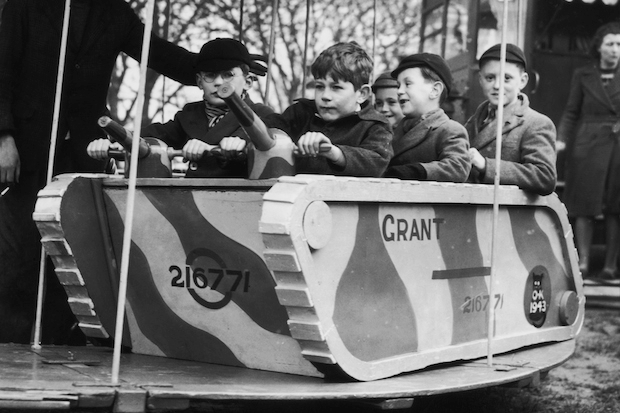The rise of the ‘misery memoir’ describing abusive childhoods, followed by the I-was-a-teenage-druggie-alkie-gangbanger-tick-as-appropriate memoir, pushed into the shadows an older tradition, the memoir of childhood pleasure, of charm and humour. Some of the greats — Gwen Raverat’s Period Piece, Diana Holman-Hunt’s My Grandmothers and I — continue to be enjoyed; others every bit as good — Joan Wyndham’s Love Lessons trilogy — must be snapped up secondhand.
Marjorie Ann Watt’s Slideshow never quite reaches these heights, but is nevertheless a welcome addition to this genre. Watts herself is a painter and illustrator, and here she uses words to depict the lost world of the prewar bohemian Hampstead upper-middle-classes. Her father, Arthur Watts, was a Punch cartoonist; her formidable grandmother the founder of PEN.
Thus the book is filled with throwaway references to ‘the Blisses’— the composer Arthur and family — or E.M. Delafield, author of The Diary of a Provincial Lady. Tagore gives a talk at her school, going ‘on and on until I was almost asleep’. Later, at art college at St Martin’s (also known as ‘this dump’), ‘Lucian Somebody’ waltzes, while later still so does ‘Norbert’ (Brainin, founder of the Amadeus Quartet), ‘horn-rim specs gleaming’. By this time it feels natural that Watts is taught by Henry Moore and Edward ‘Call me Ted’ Ardizzone with — who else? — Quentin Crisp making a flying appearance as a life-drawing model.
Yet these famous people are wallpaper, the decorative backdrop to her life, which is not nearly as much beer and skittles as an overview would suggest. After a prosperous, protected childhood, brought up by nannies (and nanny humour abounds: ‘Look at those fingernails. Are we in mourning for the cat?’), the death of her father before she is ten changes things abruptly.
Even before his death, Arthur Watts was mostly absent from her life, or, as Watts says with a child’s brutality, ‘not much of a father’. When her older half-sister sees her looking pensive after their father’s death, she asks, ‘“Are you thinking about Daddy a lot?”, and looks very sad, so I say: “Yes, a lot.” Actually, I am not thinking about him at all.’
The brilliance of the first part of the book lies in the author’s ability to recreate not merely a child’s voice, but the workings of a child’s mind. When a neighbour dies, the young Marjorie observes, ‘She is put in the graveyard under the ground with a stone on top of her. Nanny says that once you’re in there, you never come out again because you’re dead. I am not going to let that happen to me.’
But once childhood is past, that pure voice vanishes, and instead we are caught inside the solipsism of adolescence. We learn vastly more than any human could want to know about her school syllabus, boys she has a crush on and other minutiae, while all the time feeling that a more interesting story is occurring behind the scenes. Watts’s mother was left a young widow with three children, no qualifications or training, and an apparently scanty income. In her fifties, she gained a degree and became a children’s probation officer, but this is conveyed in a one-line throwaway, instead of as a story to flesh out the rows between mother and teenaged daughter that are detailed at length.
And yet, while the later sections of the book can drag, who, quite frankly, could resist a memoir where the schoolgirl narrator’s friend breathlessly reveals that ‘two teachers and the colonel all sleep together in one big bed’, only to be slapped down: ‘Grace, you shouldn’t spread rumours. It’s bad for the war effort.’
Available from the Spectator Bookshop, £14.39. Tel: 08430 600033





Comments